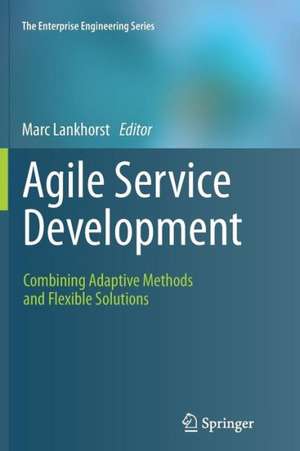Agile Service Development: Combining Adaptive Methods and Flexible Solutions: The Enterprise Engineering Series
Editat de Marc Lankhorsten Limba Engleză Paperback – 9 mai 2014
The approach described in this book focuses on the notion of a service as a piece of functionality that offers value to its customers. Instead of solely looking at agility in the context of system or software development, agility is approached in a broader context. The authors illustrate three kinds of agility that can be found in an agile enterprise: business, process and system agility. These three types of agility reinforce each other and establish the foundation for the agile enterprise. Architecture, patterns, models, and all of the best practices in system development contribute to agile service development and building agile applications.
This book addresses two audiences. On the one hand, it aims at agile and architecture practitioners who are looking for more agile ways of working in designing and building business services or who are interested in extending and improving their agile methods by using models and model-based architectures. On the other hand, it addresses students of (enterprise) architecture and software development or service science courses, both in computer science and in business administration.
| Toate formatele și edițiile | Preț | Express |
|---|---|---|
| Paperback (1) | 580.36 lei 6-8 săpt. | |
| Springer Berlin, Heidelberg – 9 mai 2014 | 580.36 lei 6-8 săpt. | |
| Hardback (1) | 641.71 lei 6-8 săpt. | |
| Springer Berlin, Heidelberg – 20 apr 2012 | 641.71 lei 6-8 săpt. |
Din seria The Enterprise Engineering Series
- 20%
 Preț: 415.47 lei
Preț: 415.47 lei - 20%
 Preț: 376.03 lei
Preț: 376.03 lei -
 Preț: 398.40 lei
Preț: 398.40 lei -
 Preț: 447.03 lei
Preț: 447.03 lei - 15%
 Preț: 485.28 lei
Preț: 485.28 lei - 18%
 Preț: 941.17 lei
Preț: 941.17 lei - 20%
 Preț: 440.24 lei
Preț: 440.24 lei - 20%
 Preț: 538.22 lei
Preț: 538.22 lei - 20%
 Preț: 395.70 lei
Preț: 395.70 lei - 20%
 Preț: 456.12 lei
Preț: 456.12 lei - 20%
 Preț: 553.06 lei
Preț: 553.06 lei - 20%
 Preț: 601.92 lei
Preț: 601.92 lei - 20%
 Preț: 879.50 lei
Preț: 879.50 lei - 20%
 Preț: 363.00 lei
Preț: 363.00 lei - 20%
 Preț: 358.52 lei
Preț: 358.52 lei -
 Preț: 347.62 lei
Preț: 347.62 lei - 18%
 Preț: 1117.34 lei
Preț: 1117.34 lei - 20%
 Preț: 1288.76 lei
Preț: 1288.76 lei
Preț: 580.36 lei
Preț vechi: 682.77 lei
-15% Nou
Puncte Express: 871
Preț estimativ în valută:
111.05€ • 115.95$ • 91.91£
111.05€ • 115.95$ • 91.91£
Carte tipărită la comandă
Livrare economică 04-18 aprilie
Preluare comenzi: 021 569.72.76
Specificații
ISBN-13: 9783642430114
ISBN-10: 3642430112
Pagini: 224
Ilustrații: XX, 204 p.
Dimensiuni: 155 x 235 x 12 mm
Greutate: 0.32 kg
Ediția:2012
Editura: Springer Berlin, Heidelberg
Colecția Springer
Seria The Enterprise Engineering Series
Locul publicării:Berlin, Heidelberg, Germany
ISBN-10: 3642430112
Pagini: 224
Ilustrații: XX, 204 p.
Dimensiuni: 155 x 235 x 12 mm
Greutate: 0.32 kg
Ediția:2012
Editura: Springer Berlin, Heidelberg
Colecția Springer
Seria The Enterprise Engineering Series
Locul publicării:Berlin, Heidelberg, Germany
Public țintă
Professional/practitionerCuprins
Introducing Agile Service Development.- Agility.- Agile Architecture.- Service Modelling.- Patterns for Agility.- An Agile Way of Working.- Stakeholder Communication.- Adopting Agile Service Development.
Recenzii
“The authors provide a blueprint for charting a path where agility becomes an outcome and attribute of system development. (…) Software engineers, architects, business architects and business stakeholders seeking to make agility a key ability of their enterprise will find this book invaluable. Agile enterprise engineering has arrived and this book is a primer.” – from the Foreword by Kerrie Holley, IBM Fellow and CTO Global Business Services, Application Innovation Services, USA
Notă biografică
As Principal Advisor Enterprise Architecture, Marc Lankhorst is responsible for Novay's activities on enterprise, business and IT architecture. His expertise and interests range from enterprise architecture and business process management to service orientation and model-driven software development. Marc headed the project that developed the ArchiMate® standard for architecture modelling, described in the book ‘Enterprise Architecture at Work’ (2nd ed., Springer 2009). He is a board member of the Netherlands Architecture Forum (NAF), one of the editors of Via Nova Architectura, and a TOGAF® 9-certified enterprise architect. He holds a M.Sc. from the University of Twente and a Ph.D. from the University of Groningen.
Textul de pe ultima copertă
Economies around the globe have evolved into being largely service-oriented economies. Consumers no longer just want a printer or a car, they rather ask for a printing service or a mobility service. In addition, service-oriented organizations increasingly exploit new devices, technologies and infrastructures. Agility is the ability to deal with such changing requirements and environments. Agile ways of working embrace change as a positive force and harness it to the organization's competitive advantage.
The approach described in this book focuses on the notion of a service as a piece of functionality that offers value to its customers. Instead of solely looking at agility in the context of system or software development, agility is approached in a broader context. The authors illustrate three kinds of agility that can be found in an agile enterprise: business, process and system agility. These three types of agility reinforce each other and establish the foundation for the agile enterprise. Architecture, patterns, models, and all of the best practices in system development contribute to agile service development and building agile applications.
This book addresses two audiences. On the one hand, it aims at agile and architecture practitioners who are looking for more agile ways of working in designing and building business services or who are interested in extending and improving their agile methods by using models and model-based architectures. On the other hand, it addresses students of (enterprise) architecture and software development or service science courses, both in computer science and in business administration.
The approach described in this book focuses on the notion of a service as a piece of functionality that offers value to its customers. Instead of solely looking at agility in the context of system or software development, agility is approached in a broader context. The authors illustrate three kinds of agility that can be found in an agile enterprise: business, process and system agility. These three types of agility reinforce each other and establish the foundation for the agile enterprise. Architecture, patterns, models, and all of the best practices in system development contribute to agile service development and building agile applications.
This book addresses two audiences. On the one hand, it aims at agile and architecture practitioners who are looking for more agile ways of working in designing and building business services or who are interested in extending and improving their agile methods by using models and model-based architectures. On the other hand, it addresses students of (enterprise) architecture and software development or service science courses, both in computer science and in business administration.
Caracteristici
Provides a truly holistic view on the foundations of an agile enterprise by combining business, process and system agility Combines agile development processes with model-driven approaches and architectural patterns Implements uncertainty reduction via an incremental and iterative evolution of the entire collection of artifacts constituting a service Includes supplementary material: sn.pub/extras










